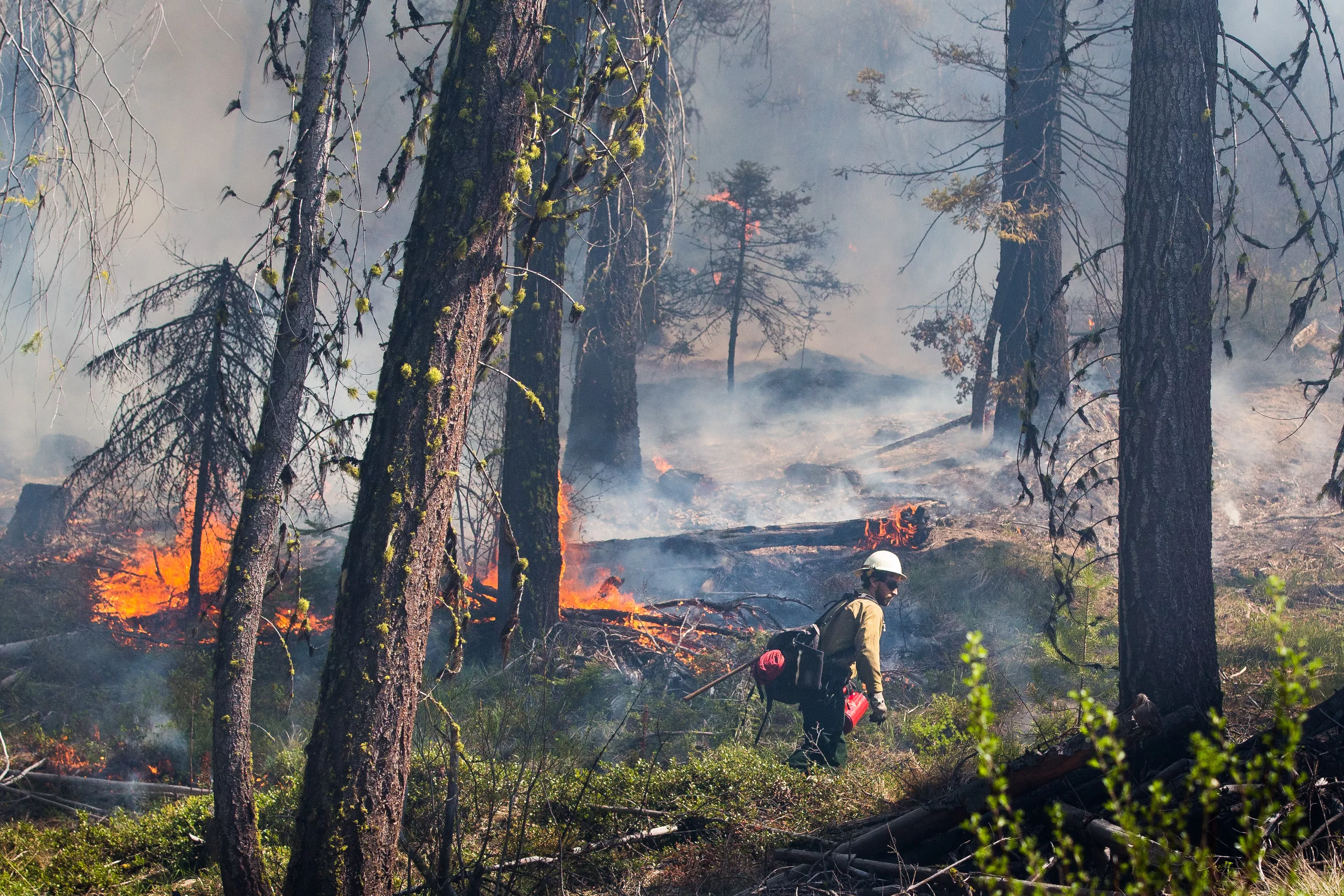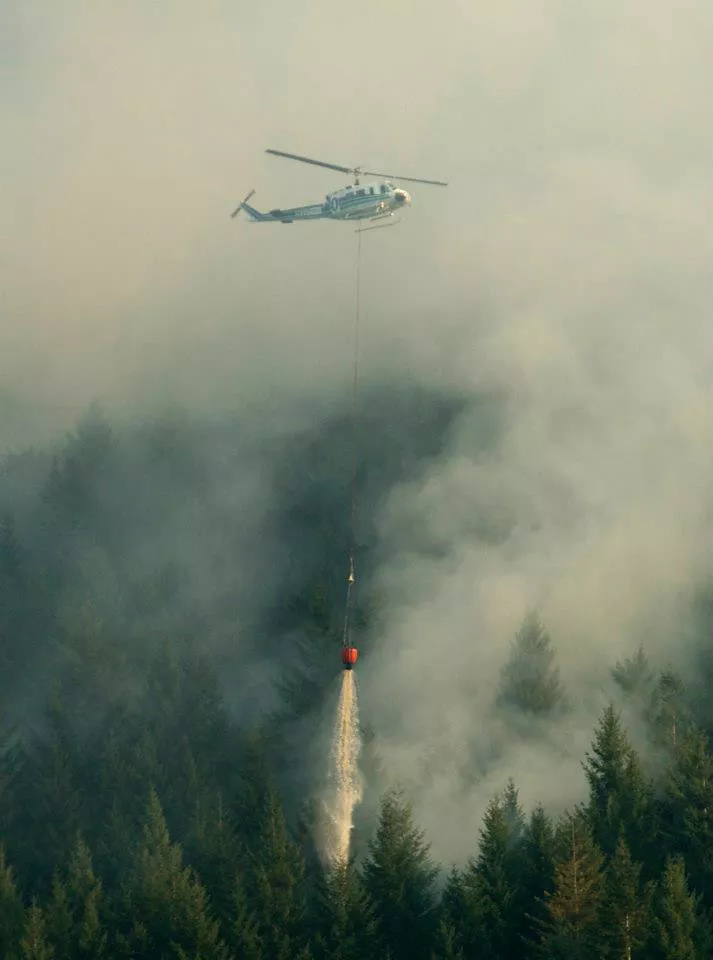Two Colville women were booked into a rural Washington jail. It became a death sentence
Critics say WA jails are letting opioid users suffer from withdrawals, leading to preventable deaths
Coronavirus could seriously hamper Washington's ability to fight wildfires as agencies focus on organizing a response to the global pandemic.

The state’s ability to fight wildland fires this summer could be seriously hampered by the coronavirus outbreak.
For one thing, Washington Public Lands Commissioner Hilary Franz said in a recent interview, agencies that usually plan for fires and recruit firefighters in early spring are instead helping organize Washington’s response to the global pandemic.
“We didn’t plan on COVID. All of a sudden, we’re in that place.” ~ Hilary Franz, state Public Lands Commissioner
Franz also is worried that fewer people will sign up to fight wildfires this summer because it’s so difficult to stay apart from coworkers on a fire line and in crowded camps where firefighters sleep.
State officials suddenly find themselves in the extraordinarily difficult position of wondering whether they can mobilize the thousands of firefighters who might be needed in a bad fire season.
“We didn’t plan on COVID,” said Franz, who, as head of the state Department of Natural Resources, manages nearly six million acres of public lands. “All of a sudden, we’re in that place.”
Franz and most of her staff are working from home while helping agencies find state land that could be used for temporary field hospitals or quarantine areas if the COVID-19 outbreak worsens. They are also lending first-responder expertise on how to handle a crisis and tap into federal aid.
Adding to the problem: Because the 2019 fire season was relatively mild, this summer’s season could be worse. Fuel that didn’t burn last year has built up on the forest floor.
The National Wildfire Coordinating Group, a federal agency that establishes fire operations standards, has published new guidance on how to deal with an infectious disease outbreak during a wildland fire incident. But “it does not address how to generally manage a workforce of firefighters during a pandemic before they are dispatched to a wildfire,” says the online wildfire news site Wildfire Today. “Nor does it suggest, other than hygiene, any different strategies to implement while suppressing a wildfire during a pandemic.”
The tightly packed camps routinely set up by wildland firefighters amount to instant towns, which the Wildfire Coordinating Group says “create an ideal environment for the transmission of infectious diseases: high-density living and working conditions, lack of access to and use of soap and sanitizers, and a transient workforce.”
“We have underinvested in wildfire resources forever.” ~ Hilary Franz, state Public Lands Commissioner
Washington’s forests are more fire-prone than ever because about 2.7 million acres of timberland are unhealthy – the result of drought, disease and insect infestation – or because fires have been suppressed, leading to a buildup of hazardous fuels. Anyone who’s driven through timber country has likely seen evidence of sickness in the form of a patchwork of reddish needles on dying evergreens, Franz said.
The coming fire season follows hard on the heels of the Washington Legislature’s failure to pass legislation requested by the Natural Resources Department (HB 2413) that would have set up a dedicated fund to pay for forestry work to reduce the risk of wildfires, primarily in Eastern Washington.
The money would have come from a $5 surcharge on property, auto and other casualty insurance policies.
That bill withered early in the session because of opposition from the insurance industry, even before the virus began dominating the news.
Environmentalists had hoped to establish a dedicated fund to keeping forests healthy.
“What we want is an underlying change, an ongoing commitment to fund forest fire prevention and forest health,” said Mo McBroom, director of government relations for The Nature Conservancy of Washington.
Some environmental groups had talked about mounting a campaign to put the insurance surcharge on a statewide voter referendum this fall. But now they fear a coronavirus-caused recession will make it impossible to pass any kind of new fee or tax increase, said Lauren Breynaert, coalition director for the Climate Alliance for Jobs & Clean Energy, a coalition that includes environmental and labor advocates as well as faith groups and racial-equity advocates.

As part of the Legislature's biennial budget last year, the Department of Natural Resources did receive an extra $48 million to fight fires, cut small and diseased trees, and burn underbrush. When the Legislature approved that appropriation, the devastating wildfires that choked the region with smoke in August 2018 were fresh on lawmakers’ minds. But the same sense of urgency had vanished this spring, likely because the 2019 wildfire season was mild by comparison, Franz said.

Some of that money also went to buy three used helicopters, bringing the total number of state-owned wildfire-fighting helicopters to 10. If the state has fewer boots on the ground, it will have to rely more heavily on those helicopters to fight fires from the air this summer, Franz said.
All 10 of those helicopters were first put in service during the Vietnam War.
“We have underinvested in wildfire resources forever,” Franz said.
DNR’s 20-year forest health plan, completed last year, outlined the steps the agency could take to reduce the fire risk on the east side of the Cascades by thinning small and diseased trees and burning underbrush.
Although the wildfire-prevention bill (HB 2413) didn’t get far through the process this year, it did get brought up as a discussion item, Franz noted.
“There was a pretty significant debate on the floor of the House on wildfires and forest health,” Franz said. “So that’s progress.”
Robert McClure contributed to this report.
This story was funded in part by the Sustainable Path Foundation.
The story you just read is only possible because readers like you support our mission to uncover truths that matter. If you value this reporting, help us continue producing high-impact investigations that drive real-world change. Your donation today ensures we can keep asking tough questions and bringing critical issues to light. Join us — because fearless, independent journalism depends on you!
— Jacob H. Fries, executive director
DonateCancel anytime.
Subscribe to our weekly newsletters and never miss an investigation.